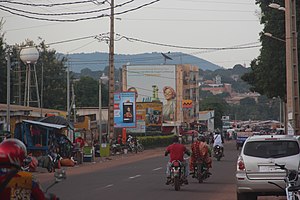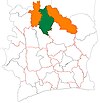
Koudou Laurent Gbagbo is an Ivorian politician who was the president of Côte d'Ivoire from 2000 until his arrest in April 2011. A historian, Gbagbo was imprisoned in the early 1970s and again in the early 1990s, and he lived in exile in France during much of the 1980s as a result of his union activism. Gbagbo founded the Ivorian Popular Front (FPI) in 1982 and ran unsuccessfully for president against Félix Houphouët-Boigny at the start of multi-party politics in 1990. He won a seat in the National Assembly of Côte d'Ivoire in 1990.

Bouaké is the second-largest city in Ivory Coast, with a population of 740,000. It is the seat of three levels of subdivision—Vallée du Bandama District, Gbêkê Region, and Bouaké Department. The city is located in the central part of Ivory Coast about 50 kilometres (31 mi) northeast of Lake Kossou, the country's largest lake. It is approximately 350 kilometres (220 mi) north of Abidjan on the Abidjan-Niger Railway and about 100 kilometres (62 mi) northeast of Yamoussoukro, the capital of the country.
The First Ivorian Civil War was a civil conflict in the Ivory Coast that began with a military rebellion on 19 September 2002 and ended with a peace agreement on 4 March 2007. The conflict pitted the government of Ivorian President Laurent Gbagbo against a domestic insurgency led by the New Forces of Ivory Coast. Following the war, a second civil war (2010–2011) would begin over the results of the 2010 Ivorian presidential election.
Ferkessédougou is a city in northern Ivory Coast. It is a sub-prefecture of and the seat of Ferkessédougou Department. It is also the seat of Tchologo Region in Savanes District and a commune. Ferkessédougou is the second-most populous city in northern Ivory Coast, after Korhogo.

Ibrahim Coulibaly was a military and rebel leader in Côte d'Ivoire. A Staff Sergeant in the Armed Forces of Côte d'Ivoire, Coulibaly had served since at least the early 1990s. As Côte d'Ivoire slid into communal conflict, Coulibaly joined the 1999 coup led by Robert Guéï. A second coup, following 2000 elections that made Laurent Gbagbo President, saw Coulibaly in a leadership position, after which he came into conflict with fellow military leader Guillaume Soro. During the ensuing eight years of division in the country, Coulibaly came into conflict with both sides, eventually returning to lead an Abidjan-based militia supportive of Alassane Ouattara. Following the end of fighting, Coulibaly was killed in Abidjan by Ouattara's forces during an attempt to disarm his group. Known popularly as "IB", he was 47 years old at the time of his death.
Daloa is a city in western Ivory Coast. It is the seat of both the Sassandra-Marahoué District and the Haut-Sassandra Region. It is also the seat of and a sub-prefecture of Daloa Department. Daloa is also a commune. In the 2014 census, the city had a population of 245,360, making it the third-largest city in the country. It lies to the west of Yamoussoukro, the capital of Ivory Coast. Daloa is an important trading centre, particularly for cocoa. The city is served by Daloa Airport and is home to the Roman Catholic Diocese of Daloa, with its cathedral at Cathédrale du Christ-Roi.

Guillaume Kigbafori Soro is an Ivorian politician who was the Prime Minister of Côte d'Ivoire from April 2007 to March 2012. Prior to his service as Prime Minister, Soro led the Patriotic Movement of Côte d'Ivoire, and later the New Forces as its Secretary-General. In March 2012, Soro became President of the National Assembly of Côte d'Ivoire. He stepped down from that position in February 2019, announcing in June 2019 that he is running to succeed President Alassane Ouattara.

The Patriotic Movement of Ivory Coast was the major rebel group in the Ivorian Civil War, which since 2005, has transformed itself into a leading political party.

The 1999 Ivorian coup d'état took place on 24 December 1999. It was the first coup d'état since the independence of Ivory Coast and led to the President Henri Konan Bédié being deposed.
Komborodougou is a town in northern Ivory Coast. It is a sub-prefecture and commune of Korhogo Department in Poro Region, Savanes District. The border of Vallée du Bandama District is six kilometres east of the town.
N'Ganon is a town in northern Ivory Coast. It is a sub-prefecture of Korhogo Department in Poro Region, Savanes District.
Lataha is a town in northern Ivory Coast. It is a sub-prefecture of Korhogo Department in Poro Region, Savanes District.
Napiéolédougou is a town in northern Ivory Coast. It is a sub-prefecture and commune of Korhogo Department in Poro Region, Savanes District.
Niofoin is a town in northern Ivory Coast. It is a sub-prefecture and commune of Korhogo Department in Poro Region, Savanes District.
Sirasso is a town in northern Ivory Coast. It is a sub-prefecture and commune of Korhogo Department in Poro Region, Savanes District.
Sohouo is a town in northern Ivory Coast. It is a sub-prefecture of Korhogo Department in Poro Region, Savanes District.
Tioroniaradougou is a town in northern Ivory Coast. It is a sub-prefecture and commune of Korhogo Department in Poro Region, Savanes District.

Presidential elections were held in Ivory Coast on 31 October 2020. Incumbent president Alassane Ouattara was re-elected with 95% of the vote amidst an opposition boycott.
Events in the year 2020 in Ivory Coast.
This period in the history of Ivory Coast was affected by the end of the 33-year reign of Félix Houphouët-Boigny in 1993, as well as demographic change which had seen the Muslim population rise from 6% in 1922 to 38.6% in 1998, including a majority in the north of the country.









